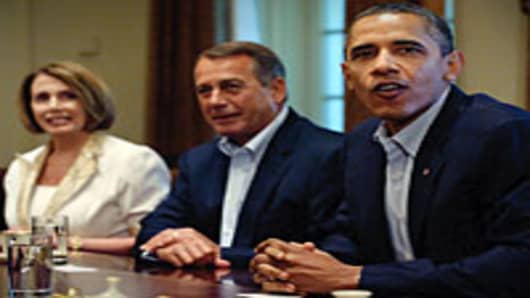President Obama hardly needs more taxes to slash the federal deficit, but Congressional Republicans do need new taxes to survive politically.
Puzzled? Be not!
Washington is a city of paradoxes, where economics may define what is good but politics defines virtue.
Since 2007, when Democrats took control of Congress, federal spending is up $1.1 trillion—$900 billion more than was needed for inflation. The federal deficit has jumped from $161 billion to $1.6 trillion.
Surely, President Obama could cut the additional spending in half and save the country $450 billion each year and $4.5 trillion over 10 years. Congressman Paul Ryan is right—the county has a spending problem, not a taxing problem.
Republicans took control of the House in the last election on a cut federal spending and deficit platform. Americans were disgusted with the President's bailouts of banks and auto companies and Democrats' big spending, and they want an adjustment to the center—perhaps the center right—but Republicans don't have a mandate to impose a severe conservative agenda.
The Tea Party remains a minority of House members, and the Republicans must strike a balance between fiscal austerity and voters aspirations on health care and the like to create a sustainable majority.
The strongest evidence I can cite is that the President's approval ratings have improved through these budget negotiations, even as economic news gets darker and darker. In daily tracking policies since June 20, his approval rating has improved and the ratio of approve-disapproval has gone from negative to positive.
Americans may hold the President accountable for the bad economy and even worse jobs market, but they don't hold much malice toward his position that some increased taxes—a contribution from the wealthy and closing abusive business deductions—has some merit.
Voters do vary on where they draw line in defining the wealth and tax abuse, but hardly any national politician can play a winning hand completely rebuking the President's fairness argument.
Saturday evening, Speaker Boehner pronounced that a grand deal on the deficit—slashing it by $4 trillion dollars over 10 years—was not possible because the President insists on higher taxes as part of the package. He was giving in to pressure from his right wing, led by Majority Leader Cantor.
The hard reality is that Cantor is politically tone deaf, and Barack Obama is not. That explains why the former is a Congressman and the latter is a President, and the 2012 elections are not like to change that.
Just as President Obama and Speak Pelosi mistook their 2008 victory as a mandate for a hard left agenda and got shellacked in 2010, Cantor and company, with their severe conservative agenda, are taking Republicans down the same well trod path of hubris and defeat.
If the Republicans were smart, they would recognize giving the President some tax measures in a package that is overwhelmingly spending cuts is the best path politically.
Obama is playing it smart, Cantor is not!
CNBC Guest Blogs: Great People-Great Ideas
______________________
Peter Morici is a professor at the Smith School of Business, University of Maryland, and former Chief Economist at the U.S. International Trade Commission.


